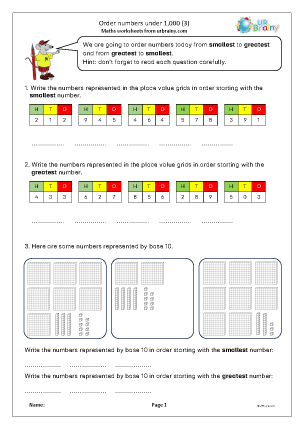Number and Place Value
Number and place value worksheets for Year 3.
The numbers start getting larger in Year 3, with reading and writing up to at least 1000. By the end of the year children will be expected to be able to count on and back in steps of 10, partition numbers, estimate and round numbers. Learning about fractions is also an important part of Year 3 Number, including counting in halves and quarters.
The Programme of Study for Year 3 proposes that children should be taught to count in multiples of 4, 8 and 50, something which we have not previously covered. Counting in eights is probably the most tricky of these, especially when the starting point is not a number in the eight times table. Most children (and many adults) will use their fingers to count on 8. Perhaps the best mental method is to add on ten and then subtract two. A useful check will be if the starting number is even all other numbers will also be even. If the starting number is odd, all other numbers in the sequence of counting will also be odd.
Counting on and back
Count on and back, including counting in tens, fifties and hundreds.
Place value
Understanding place value using hundreds, tens and ones.
Comparing and ordering numbers
Putting numbers in order, using the more than and less than signs.
Estimating and rounding
Rounding numbers to the nearest 10 and 100. Estimating on a number line and finding approximate answers.
Further number work
Further work on number, including Roman numerals.


































































